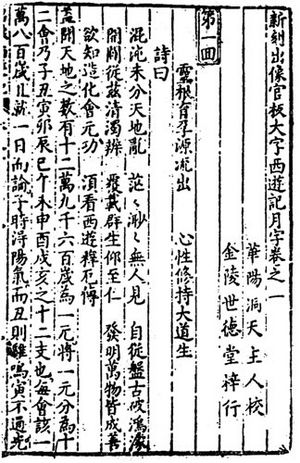Wu Cheng'en facts for kids
Quick facts for kids
Wu Cheng'en
|
|||||||||||||||||||||
|---|---|---|---|---|---|---|---|---|---|---|---|---|---|---|---|---|---|---|---|---|---|
| 吳承恩 | |||||||||||||||||||||
| Born | 1500 or 1505 Huai'an, Jiangsu, Ming China
|
||||||||||||||||||||
| Died | 1582 (aged 81–82) 1580 (aged 74–75) Huai'an, Jiangsu, Ming China
|
||||||||||||||||||||
| Alma mater | Longxi Academy | ||||||||||||||||||||
| Occupation | Novelist, poet, politician | ||||||||||||||||||||
|
Notable work
|
Journey to the West | ||||||||||||||||||||
| Chinese name | |||||||||||||||||||||
| Traditional Chinese | 吳承恩 | ||||||||||||||||||||
| Simplified Chinese | 吴承恩 | ||||||||||||||||||||
|
|||||||||||||||||||||
| Ruzhong | |||||||||||||||||||||
| Chinese | 汝忠 | ||||||||||||||||||||
|
|||||||||||||||||||||
| Sheyang Shanren | |||||||||||||||||||||
| Traditional Chinese | 射陽山人 | ||||||||||||||||||||
| Simplified Chinese | 射阳山人 | ||||||||||||||||||||
|
|||||||||||||||||||||
Wu Cheng'en (born around 1500–1505, died around 1580–1582) was a famous Chinese writer, poet, and government official during the Ming Dynasty. He was also known by his courtesy name, Ruzhong. Many people believe he wrote Journey to the West, which is one of the most important and well-known classic Chinese novels.
Contents
Who Was Wu Cheng'en?
Wu Cheng'en was born in Lianshui, a place in Jiangsu province, China. Later, his family moved to Huai'an. His father, Wu Rui, was a skilled artisan. Even though his family faced money problems, Wu Rui loved to read and write. Young Wu Cheng'en learned this love for books and stories from his father. He enjoyed reading classic literature, popular tales, and interesting anecdotes.
Life as a Student and Official
Wu Cheng'en tried many times to pass the imperial examinations. These were very difficult tests to become a mandarin, which was a high-ranking government official. He never passed these exams. However, when he was older, he finally got into the imperial university in Nanjing.
After his studies, he became a government official. He worked in cities like Beijing and Changxing County. But Wu Cheng'en did not enjoy his job. He eventually decided to leave his position. He likely spent the rest of his life in his hometown, focusing on writing stories and poems.
A Life of Writing and Reflection
During this time, Wu Cheng'en became a very talented writer. He wrote both poetry and prose. He also became friends with many other important writers of his time. Despite his talent, he remained poor throughout his life and did not have any children.
He was not happy with the politics and corruption he saw in the world. Because of this, he spent much of his life living like a hermit, meaning he lived a quiet life away from society.
What Did Wu Cheng'en Write?
Wu Cheng'en is most famous for possibly writing Journey to the West. This novel was first published in 1592 without an author's name. It was common back then for fiction writers to publish anonymously. This was because fiction was sometimes seen as less serious literature.
The Famous Journey to the West
In Chinese literary circles, many writers tried to copy the style of ancient texts from the Qin, Han, and Tang dynasties. These were written in a formal style called Classical Chinese. However, later in his life, Wu Cheng'en wrote Journey to the West using everyday language. This was a new and different approach. For over 300 years, most people in China did not know who wrote the book. But people in Wu Cheng'en's hometown believed he was the author from early on.
Who Really Wrote Journey to the West?
In the early 1900s, a scholar named Hu Shih and his students studied old records. They suggested that Wu Cheng'en was the author. Dr. Hu, who was an ambassador at the time, said that a local history book from 1625 mentioned Wu Cheng'en wrote something called The Journey to the West.
However, some experts still question this. The Dictionary of Ming Biography says that it's still not certain who wrote the novel. It also suggests that Wu Cheng'en might not be remembered today if he hadn't been linked to this famous book.
David Lattimore, a scholar, pointed out that the old history book only said Wu wrote "something called The Journey to the West." It did not say it was a novel. It could have been any version of the story, or even something completely different. Another translator, W. J. F. Jenner, noted that while Wu knew about government, the novel doesn't have political details that an average reader wouldn't know. Also, much of the story of Journey to the West already existed in folk tales. It's unclear how much Wu created and how much he simply put together and edited.
Despite these questions, Anthony C. Yu, who translated the complete novel, says that Wu Cheng'en is still "the most likely" author.
Other Writings by Wu Cheng'en
Besides Journey to the West, Wu Cheng'en wrote many other poems and stories. Most of these have been lost over time. After he died, a family member collected as many of his writings as possible. These were put into four books called Remaining Manuscripts of Mr. Sheyang. Some of his poems were also included in collections of poetry from his time.
His poems and prose are described as "stubborn" and critical of society's problems. In one of his few surviving poems, Wu described himself as having a "defiant spirit." His poetry focused on showing emotions. Because of this, his work has been compared to that of Li Bai, another famous Chinese poet. Wu also took pride in writing about real-world issues, not just fantasy. He once wrote, "My book does not just deal with the supernatural; it deals with the foibles of men too."
See also
In Spanish: Wu Cheng'en para niños
 | Laphonza Butler |
 | Daisy Bates |
 | Elizabeth Piper Ensley |


